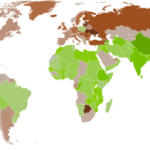Israel’s Prime Minister Pushes Back Against Calls to Protect Palestinian Civilians
- Gaza’s main hospital, Shifa Hospital, goes dark as Israel’s attacks intensify
- Five patients, including a premature baby, died after the generator ran out of fuel
- Israel claims Shifa Hospital is being used as a Hamas command post
- Israel’s prime minister pushes back against calls to protect Palestinian civilians
- Growing differences among Israel’s allies on how the fight should be conducted
- Israel agrees to brief daily periods for civilians to flee combat zones
- Tens of thousands of civilians remain in northern Gaza despite evacuation windows
- Diverging views between the US and Israel on a post-war Gaza
- Concerns grow as fighting gets closer to hospitals in Gaza City
- Over 11,070 Palestinians and 1,200 Israelis have been killed since the war began
Gaza’s main hospital, Shifa Hospital, has been plunged into darkness as Israel’s attacks on Gaza intensify. Five patients, including a premature baby, have died after the hospital’s generator ran out of fuel. Israel claims that Shifa Hospital is being used as a Hamas command post, while Hamas and hospital staff deny these allegations. The situation near Shifa and other hospitals in northern Gaza has worsened, with supplies running out and no electricity. Israeli troops have been accused of shooting at anyone outside or inside the hospital, hindering movement within the compound. Prime Minister Benjamin Netanyahu has pushed back against calls from Western allies to do more to protect Palestinian civilians, placing the responsibility on Hamas for any harm caused. There are growing differences among Israel’s allies on how the fight should be conducted, with the US pushing for temporary pauses to allow for aid distribution and Israel only agreeing to brief daily periods for civilians to flee combat zones. Tens of thousands of civilians remain in northern Gaza, despite evacuation windows being announced. The US and Israel also have diverging views on what a post-war Gaza should look like, with Israel prioritizing its security needs and the US advocating for no forcible displacement of Palestinians and Palestinian-led governance. Concerns have also grown as fighting gets closer to hospitals in Gaza City, with Shifa Hospital lacking food, water, and electricity. The casualties continue to rise, with over 11,070 Palestinians and 1,200 Israelis killed since the war began.
Public Companies: Hamas (null)
Private Companies: Doctors Without Borders
Key People: Benjamin Netanyahu (Prime Minister of Israel), Mohammed Abu Selmia (Director of Shifa Hospital), Medhat Abbas (Spokesman for the Health Ministry), Emmanuel Macron (President of France), Antony Blinken (U.S. Secretary of State), Mohammed Obeid (Surgeon at Shifa Hospital (Doctors Without Borders))
Factuality Level: 6
Justification: The article provides information from multiple sources, including statements from Israeli Prime Minister Benjamin Netanyahu and French President Emmanuel Macron. However, there are some claims that could not be independently verified, such as the claim that Israeli troops were shooting at anyone outside or inside the hospital.
Noise Level: 3
Justification: The article provides information on the current situation in Gaza and the impact on civilians, but it lacks depth and analysis. It mostly presents the claims and statements from different parties without questioning or providing evidence to support them. The article also includes some repetitive information and does not offer actionable insights or solutions.
Financial Relevance: No
Financial Markets Impacted: No
Presence of Extreme Event: Yes
Nature of Extreme Event: Armed Conflicts and Wars
Impact Rating of the Extreme Event: Severe
Justification: The article describes the ongoing conflict between Israel and Hamas, with Israeli troops encircling Gaza’s largest hospital and causing a shortage of supplies and electricity. The situation has led to the deaths of patients, including a premature baby. The conflict has escalated in recent days, with fighting near hospitals intensifying. This qualifies as an armed conflict and has severe consequences, including deaths, injuries, economic disruptions, and infrastructure damage.
 www.marketwatch.com
www.marketwatch.com 





